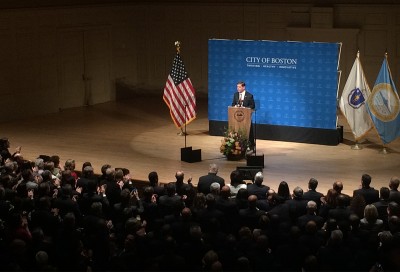Boston Mayor Martin Walsh delivered his first State of the City address at Symphony Hall on Tuesday evening to an audience of over 2,000 attendees. Among the attendees were City Council members, Massachusetts residents selected by mail, owners of local businesses and startups and community leaders.

Housing development, resources for homeless residents and primary and secondary education were of chief concern in Walsh’s address.
In the months following a 2014 Boston Globe Spotlight Team series that pointed out the safety and legality problems of many off-campus student residences — and followed the events that led to the death of Boston University student Binland Lee in a 2013 Allston fire — the City has promised to crack down on landlord and student housing policies. After receiving the first off-campus student housing census conducted in Boston, Walsh said in his address, he is encouraging universities to build more dorms.
Walsh also emphasized affordable housing, promising 250 city-owned parcels for low- and middle-income families and $20 million in funding put toward affordable housing options.
“Demand for housing in Boston is at a historic high, putting prices and rents out of reach for too many,” Walsh said. “So we’re acting now to meet this need.”
For the homeless, Walsh promised to “protect [the city’s] most vulnerable neighbors,” opening a safe shelter this week and creating the country’s first Office of Recovery Services for recovering addicts.
“We are committed to sheltering everyone, every night, no matter what issues they bring, no matter where they arrive from, no matter what,” Walsh said. “But people in trouble need more than a bed. They need a city that understands their struggles. That’s why we are building real solutions, right now.”
Shutting down the Long Island Bridge, which effectively displaced the city’s largest homeless shelter population, fueled Walsh’s plans to help further their recovery, he said.
Jennifer Colvin, 23, a Boston College graduate student, said Walsh’s plans to provide shelter are helpful, but the job doesn’t stop there.
“From a social worker’s perspective, you can’t force people to take help — that’s out of the mayor’s control,” she said. “There’s always going to be poor, and there’s always going to be wealthy, and that’s how every community strives — there’s always going to be a top and a bottom.”
On education, Walsh revealed programs to help students from early education up through college. Pointing out that 30 percent of high school students in Boston Public Schools don’t graduate in five years, Walsh said he is “not satisfied.”
BPS’s high school graduation rate stands at around 66 percent, compared to the national average of around 80 percent, according to the National Center for Education Statistics.
Walsh’s plans for improvement include adding 40 minutes of learning time to each day for all students through 8th grade, expanding full-day kindergarten throughout the city and “re-designing … high schools around pathways to college and career.”
“In the city that established public education, a city with the greatest universities in the world, access to an excellent public school is seen as a lucky break,” he said. “That is just not acceptable.”
For Kim Holman, a 27-year-old Roslindale resident who found herself recently rooted to the city, public school is a big concern.
“While I’m not ready to have children, my husband and I often ask each other what would get us to move out of Boston,” she said. “I’m always thinking, ‘For such a smart city, full of educated people, our foundation, our public schools are really lacking.’ It’s exciting from an accountability perspective to have him [Walsh] get so specific on a lot of things, so we can watch it unfold and see how it happens.”

























































































































Jennifer Colvin • Jan 14, 2015 at 9:31 am
Great summary!